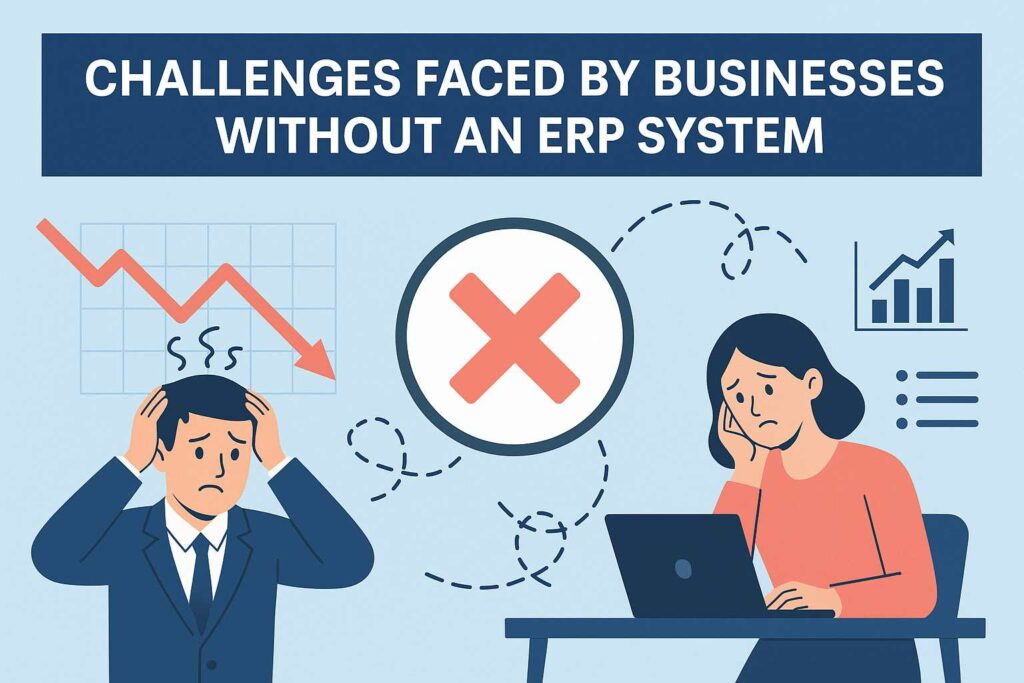Challenges Faced by Businesses Without an ERP System
Running a growing business without an ERP system can feel like trying to manage chaos with spreadsheets and disconnected tools. Many companies face serious challenges when they rely on outdated or manual processes instead of adopting integrated digital solutions.
In this article, we explore the most common challenges of ERP absence, the risks involved, and why companies increasingly turn to ERP systems for better performance and scalability.
What Are the Challenges of ERP Absence in a Business?
The challenges of ERP often surface when business operations expand and teams need to collaborate across departments. Without a centralized system, companies experience inefficiencies, miscommunication, and a lack of real-time insights.
Key problems businesses face without ERP include:
- Data silos and duplication: Different departments using separate systems often results in inconsistent or duplicated data.
- Manual entry and human errors: Without automation, businesses rely heavily on manual processes, which increases the chance of mistakes.
- Limited visibility: Managers lack real-time reporting tools to make informed decisions, leading to delayed responses or missed opportunities.
- Inefficient workflows: Approval processes, inventory tracking, and financial reporting become sluggish and disjointed.
- Poor scalability: As the company grows, disconnected systems struggle to keep up, making expansion more complicated and costly.
These issues highlight the business problems without ERP, especially in competitive environments where responsiveness and efficiency are key.
Why Companies Need ERP to Stay Competitive
An ERP system brings structure, automation, and integration to business operations. It connects departments like finance, HR, sales, inventory, and procurement, creating one source of truth for decision-making.
Here’s why companies need ERP:
- Centralized data and reporting
- Streamlined processes across departments
- Better compliance and audit control
- Improved customer service through faster access to information
- Time and cost savings from automation
Organizations that adopt ERP see measurable improvements in operational efficiency. According to industry reports, the ERP implementation benefits often include a 20–30% increase in process efficiency within the first year.
Risks of Not Having an ERP System
Continuing without ERP can expose your business to serious risks, particularly as you scale operations or expand into new markets.
Key risks include:
- Compliance issues: Without unified systems, it’s harder to maintain regulatory compliance.
- Customer dissatisfaction: Delays and errors can harm service quality, leading to customer churn.
- Security vulnerabilities: Spreadsheets and local software often lack adequate data protection features.
- Loss of competitive edge: Competitors with ERP can respond faster, optimize better, and innovate more effectively.
These risks illustrate the lack of ERP system risks that can affect a business’s reputation, profitability, and growth potential.
Manual Process Challenges in Daily Operations
When employees spend time re-entering data or tracking orders manually, productivity suffers. Manual tasks drain resources that could be better spent on growth, innovation, and customer engagement.
Common manual process challenges include:
- Inefficient inventory management
- Time-consuming financial reconciliations
- Inaccurate forecasting and planning
- Bottlenecks in procurement or approvals
- Difficulty managing remote or hybrid teams
ERP systems solve these issues by automating repetitive tasks and syncing information across the business.
How ERP Systems Solve These Challenges
Modern ERP platforms—like the Odoo ERP system—offer customizable modules for every department. They adapt to your business’s unique needs while maintaining centralized control.
Benefits of implementing ERP include:
- Real-time dashboards and analytics
- Automated inventory and order management
- Built-in compliance tracking
- Custom workflows for specific industries
- Cloud-based access for distributed teams
With ERP module customization, companies can scale their systems as their needs evolve. Implementation can be done gradually, allowing for smooth transitions.
Working With the Right ERP Partner
Getting started with ERP doesn’t have to be overwhelming. Choosing the right partner for ERP consulting services helps streamline the process and align the system with your goals.
An experienced partner offers:
- Business process mapping
- Customized ERP configurations
- End-to-end ERP implementation services
- Post-deployment support and training
They also help you measure ROI and connect your ERP investment to long-term growth strategies. The benefits of ERP software become clear when the solution is well-aligned and effectively rolled out.
FAQs
- What are the main challenges of ERP absence in small businesses?
Small businesses without ERP struggle with disorganized data, manual errors, and slow decision-making, which can hinder growth and efficiency. - Can manual systems be as effective as ERP?
No. Manual systems may work short-term but fail at scale. ERP systems automate processes, reduce errors, and improve overall productivity. - Why is ERP critical for business success?
ERP provides real-time visibility, integrates core functions, and supports strategic decision-making, key for success in competitive industries. - What happens if a company delays ERP implementation?
Delaying ERP can lead to higher costs, process inefficiencies, and lost opportunities as competitors optimize with better technology. - How do ERP systems improve customer experience?
With faster access to information, order tracking, and service history, ERP systems help businesses respond quicker and improve customer satisfaction.
Final Thoughts
Operating without ERP in today’s business environment invites risk, inefficiency, and lost opportunity. From manual process challenges to misaligned departments, the obstacles stack up quickly. But with the right planning and support, these challenges are entirely avoidable.
If you’re considering modernizing your operations, exploring the Odoo ERP system or evaluating ERP implementation services can be your first step toward smarter, more scalable business operations.

